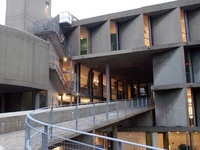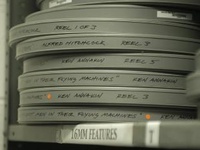
The Carpenter Center is home to the Harvard Film Archive’s Film Study Video Library, a likely haven for VES concentrators taking advantage of a proposed new film studies degree track.
When Giuliana Bruno arrived at Harvard’s Visual and Environmental Studies department (VES) 13 years ago to teach subjects including film theory, she says the department had never offered tenure to a film studies specialist. Two previous hires with expertise in the field, she says, had never made it past assistant professor. VES is a small department, with 11 permanent faculty teaching this term, and today, more than four years after receiving tenure, Bruno is still its only full professor with a focus on film studies. But after years of painstakingly laying the foundations for a degree-offering program in film studies, VES is taking the first steps towards offering undergraduates that option as soon as next fall.
For decades, Harvard has had an informal film studies program: students interested in the academic side of cinema have, with varying degrees of ease, found like-minded professors scattered across a wide range of departments. Now the Carpenter Center—the department’s Quincy Street home—is humming with meetings about how best to bring that option above ground, with an undergraduate track in film studies planned within VES and a counterpart graduate program being considered for introduction shortly thereafter.
The proposed concentration option is still in the early planning stages, as many of the administrative and philosophical specifics that have stalled previous efforts to formalize film studies at Harvard have not yet been fully sorted out.
Faculty involved say that the concentration will largely function by pulling the College’s existing offerings in film studies into a single academic framework.
Non-VES film studies courses would remain in their own departments but would count towards the still-undetermined requirements for VES’ film studies concentrators. In addition to adding some number of new film studies courses to VES’ offerings, faculty say, the major task of the new concentration option will be setting up these requirements, giving a bureaucratic skeleton to the decentralized array of courses in film studies at Harvard, which they say has grown sharply in recent years.
“It’s a matter of formalizing it,” says Kenan Professor of English Marjorie Garber, chair of VES. “This is not a stretch for us.”
Garber and others say a formalized film studies program would attract many undergraduates, both concentrators and students from other concentrations who take notice of newly-prominent electives.
“It’s going to change visibility,” Garber says.
Chair of the Department of Germanic Literatures and Languages Eric Rentschler—a key figure in the development of Harvard’s film studies program since his arrival as a tenured member of the department five years ago—echoes this view of the project, saying he hopes the concentration will take the resources already present at Harvard and “give them programmatic sense.”
To that end, he says, an 11-member committee of film studies faculty from VES and beyond has met once already and plans to meet three more times this semester. The committee is charged with hammering out the nuts and bolts of what will eventually be a proposal to the VES department, which will be able to approve, deny or send the proposal back for revisions. If approved by VES—which Rentschler says he hopes will happen by the end of the current calendar year—the film studies plan would come before the Educational Policy Committee (EPC).
Garber says she hopes the EPC will review the proposal within the academic year, while Rentschler says he thinks that committee could have a copy of the proposal as soon as early winter.
After the EPC’s go-ahead, the proposal would have to pass through the Faculty Council and, finally, the full Faculty of Arts and Sciences (FAS) before film studies can join Harvard’s existing concentrations and tracks.
Members of the present film studies committee—whose membership is distinct from that of the FAS ad hoc film studies committee, which publishes an annual guide to film studies at Harvard—stress that the proposal is still in a preliminary stage and many of the specifics of the planned concentration have yet to be determined.
“We will do it right, rather than try to do it fast,” says Assistant Professor J.D. Connor ’92. Connor, who joined Harvard’s faculty this fall with a joint appointment to VES and the Department of English and American Literature and Language, is also a Crimson editor.
Connor’s return to Cambridge was one of the most recent milestones in a long buildup to the present high tide for film studies at Harvard.
Read more in News
Conservative Activist Pulls for Permanent Tax Cuts














